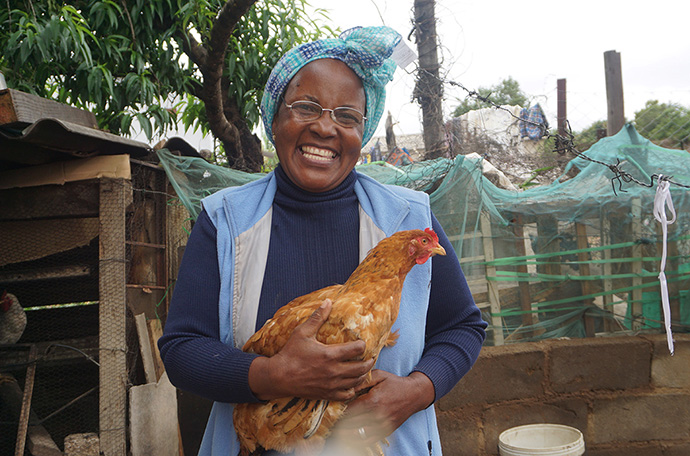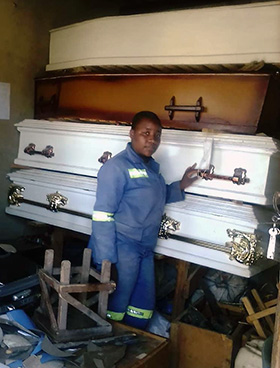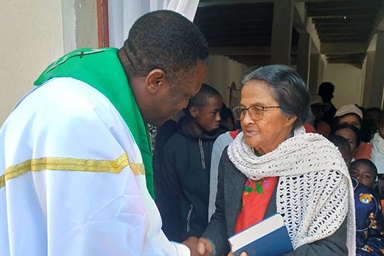In a year dominated by a global pandemic, food insecurity and other crises, some United Methodists in Zimbabwe are celebrating bright spots, including booming business ventures and new career opportunities.
When United Methodist Women funded a poultry project under the Ministry with Women, Youth and Children in the Masvingo District in February, little did they know that the beneficiaries would need the income more than ever amid lockdowns to stop the spread of COVID-19.
Many of the 78 women who each received 20 chicks and feed as part of the $8,000 project ventured into other business endeavors. Now, they are benefiting from eggs and meat — sold to restaurants and people in the community — and even manure, which is used in the production of organic crops.
Some have used the proceeds to open home-based banks, creating a culture of saving.
Teenagers and children also have started moneymaking enterprises during the pandemic, including a coffin-making business and horticulture business.
Tendai Rebecca Gurupira, area coordinator for the Ministry with Women, Youth and Children, appreciated the efforts made by the women.
“They have diversified. All are harvesting eggs and incubating some of the eggs, have different stages of chicks and are using by-products in other projects,” she said.
“Everyone has realized an income from the sales of excess cockerels (young roosters) and have plowed back the proceeds into the project by buying feed and other project-related demands.”
The Rev. Jairous Mafondokoto, Masvingo District superintendent, said the project has been helpful to many families beyond the income generated.
“During the COVID-19 pandemic, when people were cooped up, the poultry-rearing project provided occupational therapy, reducing stress and enhancing good health. Every beneficiary has a story to tell from the experience,” he said.
Rutendo Damba, a 47-year-old widow and member of Gutu Mupandawana United Methodist Church, said she has 27 chicks of varying ages. “We now have improved diet from eggs and meat and I have gained a lot of knowledge and skills in poultry production,” she said.
Damba bought a safe to save money for an incubator, which she expects to be able to afford in August of next year.
Charity Chiwawa, 48, said that in her first batch of 20 birds, she had seven young roosters, which she sold to buy feed for the remaining hens.

Charity Chiwawa holds a chicken from her poultry project in the Masvingo District of Zimbabwe. From her first batch of 20 birds, she had seven roosters, which she sold to buy feed for the hens. Photo by Kudzai Chingwe, UM News.
Nyengeterai Mafongoya, 56, has multiplied her gift; she now has more than 100 birds.
“My objective is to penetrate the male-dominated industry and become one of the (leading) day-old chick breeders in Masvingo town,” she said, adding that she traded 28 chicks in exchange for a cage that she is using to keep the newborn chicks safe from predators.
She said she also paid her gift forward by giving some of her chicks to two other women in the community. She plans to offer technical guidance so that they can be successful with the project.
The work also gained the support of her husband, she said. “(He) previously showed no interest in the project (but) is now excited and very supportive, and I am grateful for that.”
Prudence Shito, 22, has opted for the production and sale of free-range table eggs.
“Because of this project, I no longer need to ask for cash from my parents,” she said, adding that she also plans to gift some of her chicks to other young women.
“I heard that most youths engaged in risky behavior due to idleness associated with the COVID-19 pandemic lockdown. This project kept me busy and safe from peer pressure,” she said.
Locadi Mazumba said the program has uplifted her spiritually, economically and psychologically.
“The situation has taught us women to take care of the family in a challenging time as this.”
Besides getting eggs and meat, she is making use of the chicken manure to diversify into the organic crop farming industry.
“I am able to supply my kitchen with a variety of vegetables and even sell the surplus,” she said. “This project is a family project. My children and husband participate. This has united us as a family. … This has made our lives easier.”
Gloria Chirimbana, chairperson for the Masvingo District Ministry with Women, Youth and Children, said that the women’s hard work is paying off.
“If the concept of passing on the gift is well managed, every member within the circuits will eventually benefit from the project. … Every beneficiary has a story to tell. Their lives will never be the same again,” Chirimbana said.
Fifteen-year-old Vanessa Chingwende, a woodworking student at United Methodist Mutambara Mission School, also has seen some benefits from the pandemic.

Fifteen-year-old Vanessa Chingwende stands beside finished coffins ready for sale in her workshop room near Marange, Zimbabwe. Photo by Chenayi Kumuterera, UM News.
The teen has used the extra time during lockdown to start a coffin-making business.
“Per month, I can earn about $250 U.S. from sales (of coffins) … and many other woodworking products. I started this work when I was in grade four inspired by my father, a carpenter. We work as a family in order to earn our living,” she said.
The money helps her to pay her school tuition and provide for her brothers and sisters.
“The COVID-19 lockdown brought me an opportunity to earn a wage from working hard with my father and mother,” she said, adding that she wakes up by 3 a.m. each day to start her work.
With the lockdown shuttering most businesses, demand for coffins and other supplies increased, said the Rev. Pauline Nyamudzura, Marange District superintendent. There have been more than 10,000 confirmed COVID-19 cases in Zimbabwe and more than 275 deaths, according to Johns Hopkins University data.
The Rev. Marian Sigauke, pastor of Ringai United Methodist Church circuit in Marage District, said Chingwende’s passion for woodworking also has benefitted her church. “She has volunteered to repair the church’s benches, chairs, doors and window levers,” the pastor said.
Eleven-year-old Bvunzaishe Sangende also has committed himself to hard work during the lockdown. He started his own horticulture business, which has helped him pay tuition fees and buy books. He’s also raising rabbits and road runners.
Widow Maudy Mabika, 75, is doing the same. She said horticulture and animal husbandry make her “respectful and industrious.”
“I encourage young women, boys and girls to be proactive in horticulture, not to loiter around. Money is in your hands,” she said.
Nyamudzura is helping to fight poverty in her district through economic empowerment. She is hoping to secure funding to start a soap-making project that will support women and save people money on household cleaners.
“I am seeing (myself as) a future businesswoman who can inspire other girls, women and the entire world,” she said.
Chingwe and Kumuterera are communicators in Zimbabwe.
News media contact: Vicki Brown at (615) 742-5470 or [email protected]. To read more United Methodist news, subscribe to the free Daily or Weekly Digests.
Like what you're reading? Support the ministry of UM News! Your support ensures the latest denominational news, dynamic stories and informative articles will continue to connect our global community. Make a tax-deductible donation at ResourceUMC.org/GiveUMCom.




